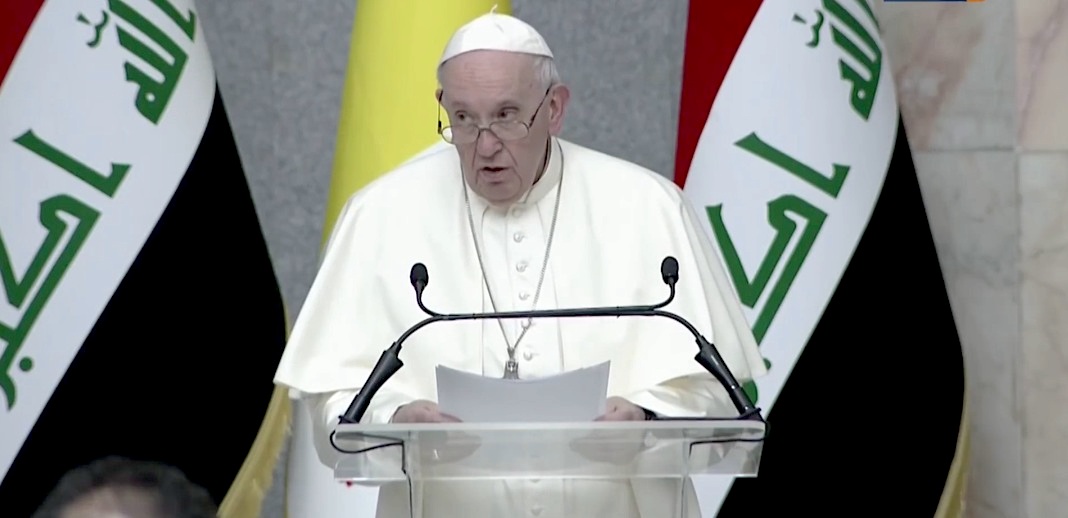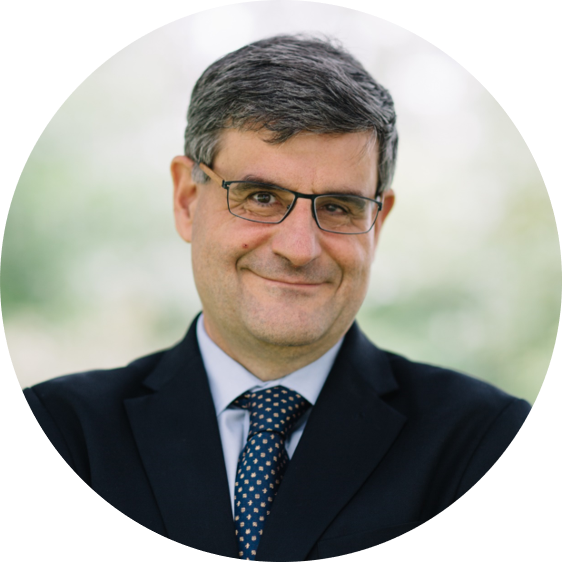
To Iraq and Back:
Takeaways of an Historic Papal Visit
Rafael Domingo
Pope Francis speaking at the Presidential Palace in Baghdad, March 5th, 2021. Wikimedia Commons (CC BY 3.0).
Any way you look at it, Pope Francis’ March trip to Iraq had the appearances of being rash and even reckless on the surface. This Mideast country has been ravaged by years of war and rocked more recently like the rest of the globe by the COVID-19 pandemic. In no way would the pope’s personal safety be fully guaranteed. Suicide bombings, recent rocket attacks on U.S.-backed Coalition forces, and tit-for-tat reprisals make for a bleak tableau on which to launch a papal visit. Age-old enmities, fanaticism and strife are just some of the woes to have befallen this ancient land beside the Tigris and Euphrates rivers once known as Mesopotamia. Against all odds, the pope took a leap of faith and daring, his spiritual intuition overruling the naysayers among his advisers wary of such a potentially perilous mission.
The pope who so identifies with the poor, the suffering and the downtrodden of society was well aware that Iraq in our day is a glaring example of a people living on edge, wracked by years of suffering and violence. Thus, he saw, being present in person was his duty as Roman Catholicism’s supreme leader and compelling grounds to take the risks of such a visit. His decision to travel was brave, but not rash or reckless. And it was nothing short of historic. As Francis remarked in the traditional news briefing he gave on the flight back to Rome, he had prayed long and hard for this visit to come about, waiting patiently for the idea to fully take shape in his heart and come to fruition. He knew he would be fulfilling a wish of John Paul II, who the biographers said had wept upon learning Iraq would be off limits during his pontificate. Benedict XVI also had longed for such a visit but then war precluded any possibility of making such a trip.
Suicide bombings, recent rocket attacks on U.S.-backed Coalition forces, and tit-for-tat reprisals make for a bleak tableau on which to launch a papal visit.
Francis rightly approached the visit as a pilgrimage of faith, as a gesture of love and admiration for the great cradle of monotheistic religions, a balm for its war-weary people, and for the small lot of persecuted Christians there, beset by much discrimination and hardship. The pontiff went to Iraq without reservations, to be a tangible witness, a voice for peace and dialogue, a presence to heal divisions, to pray and to be surprised both by the joys and sufferings he would encounter in Iraq today.
At an interfaith meeting organized on the plain of Ur, from which Abraham sprang, the pope was deeply moved to hear the story of a member of the Sabae Mandean community who lost his life while trying to save the family of a Muslim neighbor. Francis also was profoundly impressed by his visit to a Baghdad church that was the scene of a horrific massacre years earlier. He heard the testimony of a Christian mother who forgave from the heart those who had killed her son. Describing that encounter with the woman, the pope told journalists on his plane ride home of her lesson in forgiveness: “This is pure Gospel.” In reality, this entire journey of Francis was pure Gospel.
Francis has sought in visiting Iraq to drive home the message of his third encyclical “Fratelli tutti”—”All Brothers”—in which he appeals for greater human solidarity, fraternal love and the rejection of war. During his visit to Iraq he quoted profusely from it. One such remark drawn from the encyclical delivered in his speech to the governing authorities and assembled diplomats encapsulated his thoughts perfectly: “A society that bears the mark of fraternal unity is a society whose members live in solidarity with each other.”
Yes, we are all responsible for making the critical decisions of how we will live together on planet Earth. Will we be competitors, adversaries, outright enemies, or dare we be brothers? If we live as enemies, we create a world of violence, war, and fanaticism, as has happened in Iraq of contemporary times. If we live as competitors, we risk building a world of debilitating social inequalities that falls easy prey to the evils of discrimination, corruption, and the shameful abuse of power. Yet if we live as brothers, as worthy children of the same God, we become—in the pontiff’s words—”responsible for the fragility of others as we strive to build a common future.” (“Fratelli Tutti” No. 115). In other words, if we become partners in caring for the most vulnerable in our families, our society, and our world today, we live in greater peace and solidarity.
If we become partners in caring for the most vulnerable in our families, our society, and our world today, we live in greater peace and solidarity.
Achieving this vision of solidarity is not easy, but it is not an unattainable utopian dream either. The pope insisted that “fraternal coexistence requires patient and sincere dialogue, safeguarded by justice and respect for the law.” Francis gave us a magnificent example of the kind of dialogue he seeks when he called in Iraq upon the Grand Ayatollah Ali Al-Sistani, spiritual leader of Shiite Islam. And the message the pope delivered over and over was this: that all religions must serve the cause of solidarity and universal peace.
Francis’s visit to Iraq marked a new milestone in the country’s pursuit of regeneration and rebuilding. It gave new impetus to inter-religious dialogue and encouraged good will and fresh hopes for those working toward a resolution of the seemingly intractable conflicts of the Middle East and beyond. It was a trip enshrining his hopes for the transformation of international law into something even greater than the mere governance of sovereign states, into a global law serving the greater good of humanity in solidarity with all peoples and nations. Remarkably so, this bold mission to Iraq served to showcase to the world the audacity of this octogenarian pontiff from Argentina who listened, in silence, to the quiet whisperings of the spirit of God.♦
Note: A version of this piece previously appeared on CNN and is reproduced here with permission.

Rafael Domingo is Spruill Family Professor of Law and Religion at Emory University and Alvaro d’Ors Professor of Law at the University of Navarra
Recommended citation
Domingo, Rafael. “To Iraq and Back: Takeaways of an Historic Papal Visit.” Canopy Forum, August 20, 2021. https://canopyforum.org/2021/08/20/to-iraq-and-back-takeaways-of-an-historic-papal-visit

